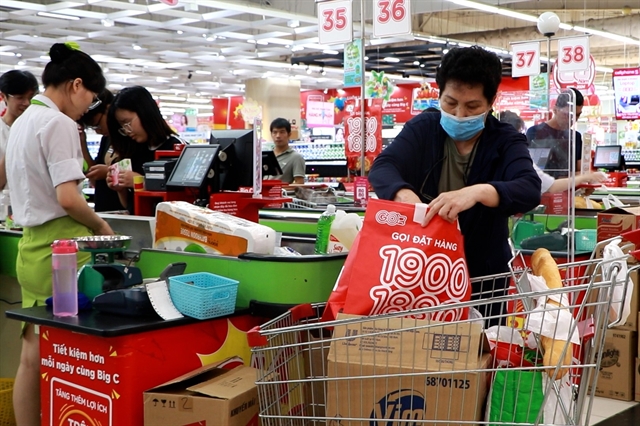Plastic Bag Free Day pushes for changes in consumer habits
Society – Economy - Ngày đăng : 20:54, 03/07/2024
 |
| Customers are given reusable bags when shopping at BigC Thăng Long Supermarket on International Plastic Bag Free Day. — VNS Photo Quỳnh Anh |
Nhật Hồng, Quỳnh Anh
HÀ NỘI — Light, cheap and they can contain anything from solid to liquid; plastic bags have always been popular for grocery shopping in Việt Nam.
However, recognising the adverse effects of these non-biodegradable bags on the environment, retailers are advocating for changes in consumer habits.
July 3 this year marked the second time the Plastic Bag Reduction Retailers Alliance of Việt Nam celebrated the International Plastic Bag Free Day with various customer initiatives.
Nguyễn Thùy Anh, Senior Communications and Outreach Officer of the International Union for Conservation of Nature in Việt Nam said: “This year’s campaign sees active participation from many businesses and this number is increasing. Several retailers are also implementing campaign activities nationwide, which is a good sign that shows their proactiveness.
“We hope that this campaign will not only take place on July 3, International Plastic Bag Free Day, but that businesses and retailers be more proactive in reducing the use of plastic bags all year round.”
As a member of the alliance, AEON Việt Nam now lets shoppers rent a reusable bag for their purchases at only VNĐ5,000 (20 US cents), which is fully refunded when they turn the bag at the counter.
The supermarket chain also has a ‘greenline’ – a priority check-out lane for customers who opt for environment-friendly products, with no plastic containers or packaging from its food court.
Central Retail Việt Nam, which owns GO!, BigC and Tops Market, has been calling for customers to bring their own shopping bags and giving out reusable ones on July 3.
Customers can also buy these multi-use bags at VNĐ9,000 on normal days, or choose the free, recycled cardboard boxes offered by the supermarket.
BigC Thăng Long supermarket director Nguyễn Minh Tuấn said: “This initiative aims to encourage customers to use these bags for multiple shopping trips.
“Additionally, we have collaborated with over 30 food suppliers to switch from plastic packaging to biodegradable materials.”
The changes and efforts have been met with positive response from customers.
Betty Adrian, an Indonesian woman who has lived in Việt Nam for the past seven years, said she only took the single-use bags the very first time she went shopping here.
“Every time I go to the supermarket or other shops, I always bring my own bags. If I use plastic, it’s not good for the earth,” she told Việt Nam News.
Other shoppers, like Ngô Thuyết, take it up a notch by mindfully bringing designated containers for their shopping trips.
“I bring my own insulated bag for frozen items, and another reusable bag for dry goods. When I buy a lot of things, I pack them up in cardboard boxes [at the cashier] to reduce the use of plastic bags,” she said.
 |
| Ngô Thuyết packs the items she bought in her reusable shopping bags to reduce single-use plastics. — VNS Photo Nhật Hồng |
Ngọc Linh, a senior-year student who often shops at BigC, agreed and said people should use plastic bags less.
“I used to be a cashier, and when customers take a lot of plastic bags, they often throw them away and that’s not good.
“Sometimes these are also reused as trash bags, which I think should not be recommended.”
Call for change
Statistics from the Worldwatch Institute estimate that on average since 2002, about five trillion plastic bags have been produced, used and discarded every year.
In Việt Nam, data from the Ministry of Natural Resources and Environment shows that the country counts over 1.8 million tonnes of plastic waste annually and among that there are 30 billion plastic bags.
On average, one household in Việt Nam can use up to a kilogramme of plastic bags each month, of which 80 per cent are thrown away after just one use.
Plastic waste accounts for 8-12 per cent of household solid waste, but only about 12 per cent of them undergo treatment and are recycled, while the rest are either buried or burned in landfills, according to Vietnam Plastics Association.
Recognising the negative impacts of these non-biodegradable containers and packaging to the environment, Việt Nam has been taking actions to address the issue.
The 2020 Law on Environmental Protection stipulates the extended producer responsibility on recycling and waste treatment, while the Prime Minister’s Decision 1316/QĐ-TTg on strengthening plastic waste management in Việt Nam was approved in July 2021.
Nguyễn Trung Thắng, Deputy Director General of the Institute of Strategy and Policy on Natural Resources and Environment said: “Our country has adopted many strategies and policies to reduce plastic waste, a majority of them non-biodegradable plastic bags.
“Therefore, activities that aim to reduce non-biodegradable plastic bags are of great significance, so that everyone can join in reducing plastic waste in our environment.” — VNS
